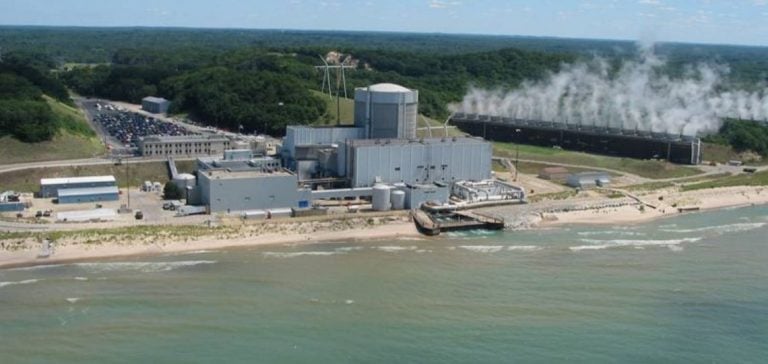In the USA, for the first time, two energy companies are planning to restart previously shut-down nuclear power plants.
This initiative is designed to meet the country’s growing demand for electricity, while optimizing costs and time compared with building new facilities.
Constellation Energy announces plans to return a reactor at the Three Mile Island plant in Pennsylvania to service by 2028.
This site is known for the 1979 nuclear incident, the most serious in American history, but the reactor in question was not involved in that event.
At the same time, Holtec is working to reactivate the Palisades plant in Michigan, with the aim of restarting it by the end of 2025.
A strategic choice to meet energy demand
According to the Energy Information Administration (EIA), electricity consumption in the United States is set to increase by 15% between 2022 and 2050, due in particular to the growing electrification of transport and industry.
In view of this projection, restarting existing nuclear power plants is seen as a rapid and economically viable solution for increasing production capacity without undue delay.
Constellation Energy’s project is part of a 20-year electricity supply contract with Microsoft, reflecting the interest of major technology companies in stable, reliable energy sources.
For its part, Holtec has filed an application with the Nuclear Regulatory Commission to resume operation of Palisades, which would be the first time in the USA that a nuclear power plant has been reactivated.
Controlled costs for increased capacity
The costs associated with restarting these plants are significantly lower than those of building new reactors.
Holtec estimates the investment required for Palisades at around two billion dollars, while Constellation Energy forecasts a budget of 1.6 billion dollars for Three Mile Island.
By comparison, construction of the two new reactors at the Vogtle power plant in Georgia, which began in 2009, required more than $30 billion and has been subject to numerous delays.
This cost difference is explained by the fact that the main infrastructure for the existing plants is already in place.
This means that companies can concentrate their investments on modernizing equipment and bringing it up to current standards.
This approach significantly reduces commissioning times, a major advantage in a context of growing energy demand.
Technical and regulatory challenges
Restarting closed nuclear power plants does, however, raise technical and regulatory challenges.
The facilities concerned, commissioned in the 1970s, have to be modernized to meet current safety standards, particularly in terms of cooling systems, command and control, and resistance to natural or accidental events.
Companies must obtain approval from the Nuclear Regulatory Commission (NRC), which imposes strict procedures to guarantee nuclear safety.
These include in-depth inspections, performance tests and assessments of waste management plans.
According to experts at the Massachusetts Institute of Technology (MIT), these challenges are surmountable thanks to accumulated industry experience and technological advances.
Outlook for the nuclear sector
These initiatives could encourage other players in the nuclear sector to consider similar projects.
NextEra Energy Resources is examining the possibility of restarting the Duane Arnold power plant in Iowa, which closed in 2020.
Although no official decision has yet been taken, this reflection reflects the growing interest in exploiting existing nuclear infrastructure.
Federal government support plays a key role in these projects.
Holtec has secured a $1.5 billion loan from the Department of Energy to finance the restart of Palisades.
This involvement reflects the authorities’ desire to diversify the national energy mix and strengthen the security of electricity supply.
Restarting existing nuclear power plants offers an opportunity to respond rapidly to today’s energy challenges.
By exploiting existing infrastructure, the United States can increase its electricity production capacity while keeping costs and lead times under control.
This strategy could influence the future direction of the sector, complementing investments in renewable energies and emerging technologies.






















